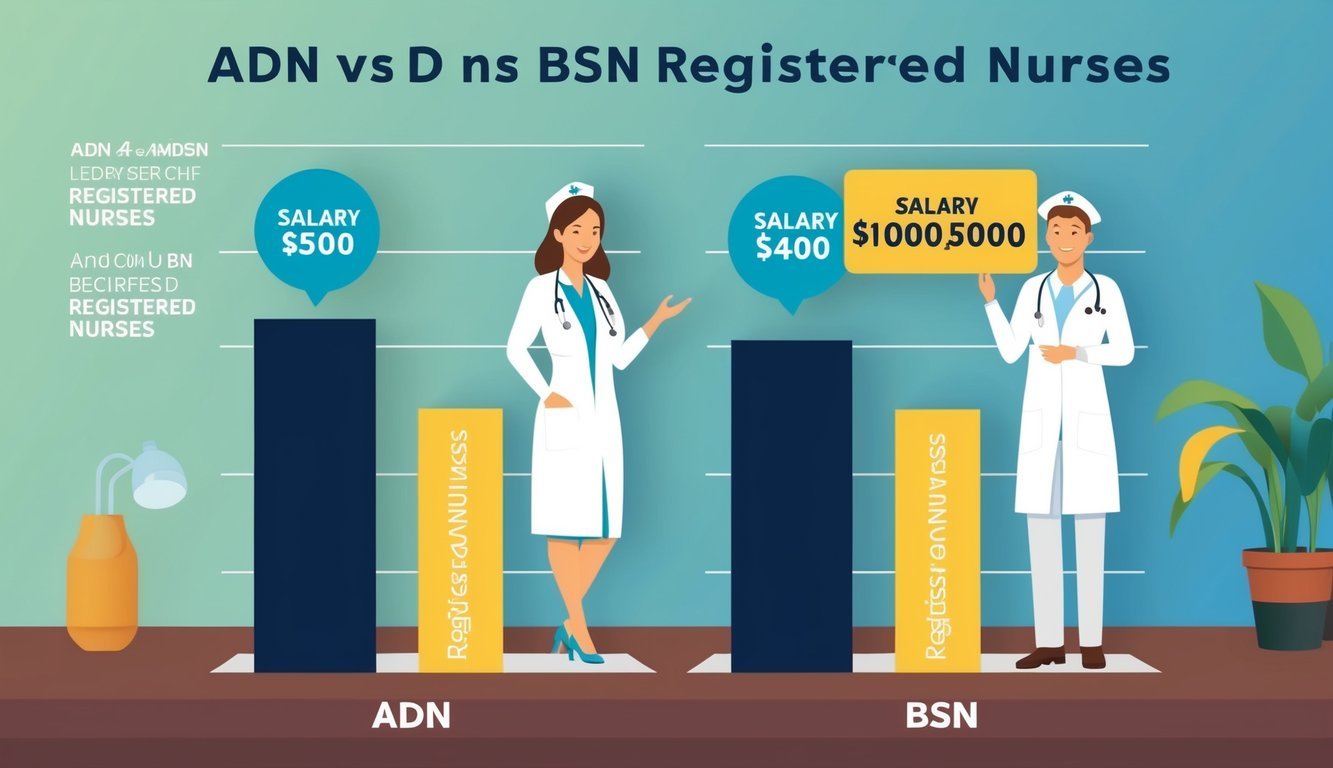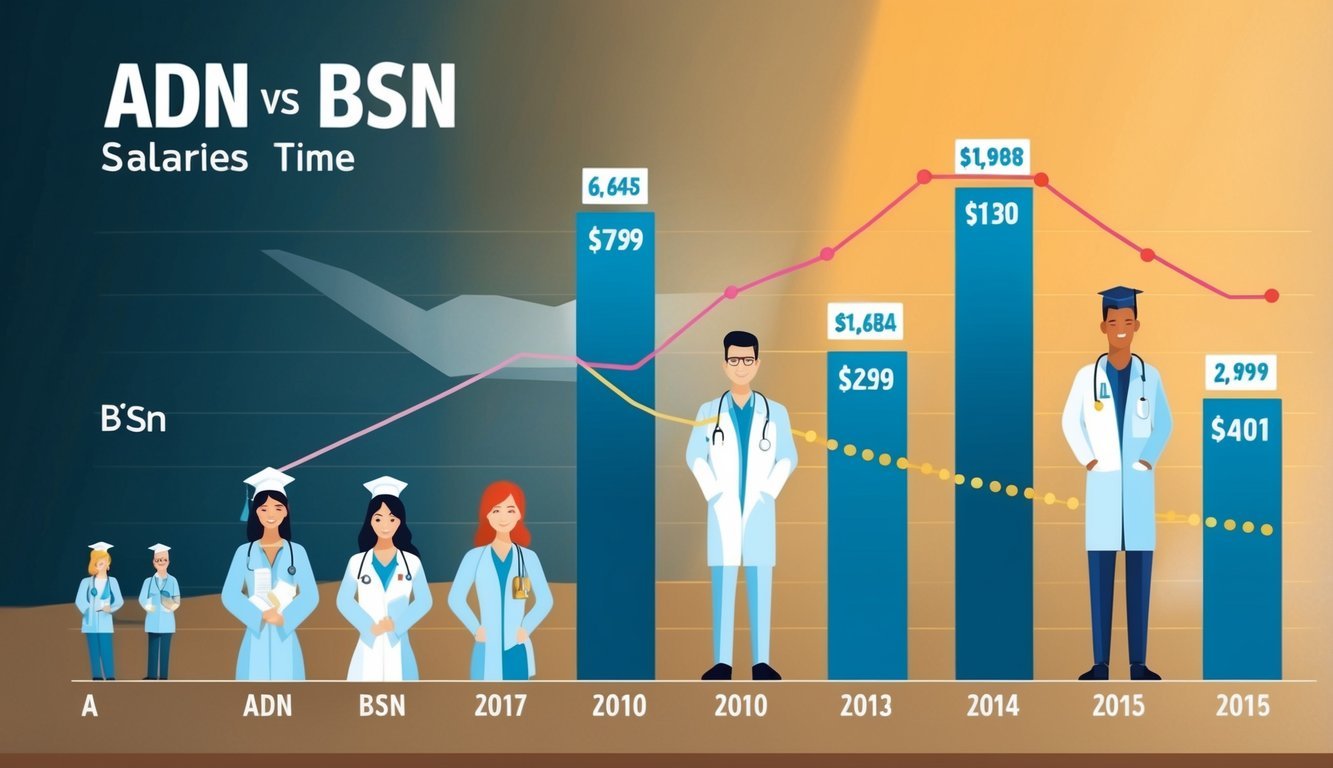As you consider a nursing career, understanding the differences in earning potential between an Associate Degree in Nursing (ADN) and a Bachelor of Science in Nursing (BSN) can significantly impact your decision. BSN-prepared nurses typically earn higher salaries over their careers.
They average $500,000 more than ADN-prepared nurses over 30 years.
This financial difference extends not only to initial salaries but also to long-term career growth and advancement opportunities.
ADN programs can be appealing due to their shorter duration and lower costs, allowing you to start working as a registered nurse (RN) sooner.
However, pursuing a BSN can open doors to more diverse roles within the nursing profession.
It can also lead to leadership positions with greater responsibilities and higher compensation.
Nursing education ultimately plays a crucial role in shaping your career path and potential earnings.
To navigate this important decision, it’s essential to weigh your options carefully and consider the potential return on investment for each educational route.
For instance, BSN-prepared RNs may enjoy average salaries around $94,000 per year compared to $76,000 for those with an ADN.
Resources like NurseJournal.org provide comprehensive comparisons to help you make an informed choice.
Educational Pathways to Registered Nursing

When pursuing a career in registered nursing, you have two primary educational pathways: the Associate Degree in Nursing (ADN) and the Bachelor of Science in Nursing (BSN).
Each path has unique attributes, including program length, required credits, and licensure details.
Associate Degree in Nursing (ADN) Program
The ADN Program typically takes about 2 years to complete, making it a quicker route to enter the nursing workforce.
Most programs require around 60 to 75 credits.
You will study essential nursing courses along with general education subjects.
Key components include:
- Foundational Nursing Courses: Focused on patient care, anatomy, and pharmacology.
- Clinical Experience: Hands-on practice in healthcare settings.
Upon completion, you must pass the NCLEX-RN exam to obtain your nursing license.
The ADN can lead to entry-level nursing positions, but limited advancement opportunities compared to those holding a BSN.
For more details on ADN programs, consider visiting NurseJournal.
Bachelor of Science in Nursing (BSN) Program
The BSN Program generally spans 4 years and requires about 120 to 130 credits.
This program prepares you for a broader scope of practice in nursing.
Core nursing education includes:
- Advanced Nursing Practices: In-depth study of patient care techniques.
- Leadership and Management: Skills needed for career progression.
- Research and Evidence-Based Practice: Helps to enhance patient care strategies.
Graduating from a BSN program increases your job prospects and potential salary.
You will also be eligible for leadership roles and specialized nursing fields.
Like the ADN, a BSN graduate must pass the NCLEX-RN for licensure.
Explore additional resources on BSN programs through Nurse.org.
Comparative Analysis of ADN vs. BSN Salaries

Understanding the differences in salaries between Associate Degree in Nursing (ADN) and Bachelor of Science in Nursing (BSN) can guide your career decisions.
The initial salary discrepancies, long-term earning potential, and geographic influences play crucial roles in determining your financial trajectory in nursing.
Initial Salary Differences and Factors
When you enter the nursing profession, the initial salary can differ significantly based on your educational background.
According to recent data, a BSN nurse’s starting salary typically averages around $92,000, while an ADN nurse may begin at approximately $75,000 per year.
Factors influencing these salaries include the level of education, specialized training, and the specific healthcare facility you choose.
Typically, BSN graduates often secure roles in hospitals with higher clinical demands, leading to better compensation.
Long-Term Earning Potential
Over a nursing career lasting around 30 years, a notable gap in earnings emerges. BSN-prepared nurses can potentially earn upwards of $500,000 more than their ADN counterparts.
This figure emphasizes the importance of considering educational investments.
For instance, if you earn approximately $17,000 more annually as a BSN nurse, that can significantly impact your financial planning and retirement savings.
The cumulative effect of higher salaries and opportunities for advancement can benefit your long-term career strategy.
Influence of Geographic Location on Salaries
Geographic location significantly affects nursing salaries.
States with higher costs of living or a greater demand for nurses may offer increased compensation.
For instance, nursing salaries in metropolitan areas may exceed the national average.
Here’s a general comparison of average salaries across a few regions:
| Location | ADN Average Salary | BSN Average Salary |
|---|---|---|
| California | $80,000 | $100,000 |
| Texas | $70,000 | $85,000 |
| Florida | $65,000 | $80,000 |
In summary, understanding these regional salary differences helps you make informed decisions, factoring in not just potential earnings but also the cost of living in your desired location.
For detailed salary comparisons across various regions, consider visiting resources like Payscale for more comprehensive data.
Career Opportunities and Advancement
Pursuing a Bachelor of Science in Nursing (BSN) opens up a range of career opportunities and pathways for advancement compared to an Associate Degree in Nursing (ADN).
You can find a variety of roles that not only enhance your skills but also increase your earning potential and job satisfaction.
Roles and Responsibilities
With a BSN, you typically encounter broader roles and responsibilities in nursing.
While ADN-prepared nurses may focus primarily on bedside care, BSN nurses often engage in patient education, community health, and care coordination.
Responsibilities may include:
- Developing patient care plans
- Conducting research and evidence-based practice
- Managing patient and family education
- Coordinating care across multiple services
Due to the depth of training, BSN nurses are often preferred for roles in hospitals and healthcare settings that require strong leadership and critical thinking skills.
Nursing Specialties and Certifications
A BSN degree grants you greater access to nursing specialties and certifications.
You can specialize in fields like:
- Pediatrics
- Emergency Nursing
- Oncology
- Nurse Informatics
Advanced Practice Registered Nurses (APRNs), such as Nurse Practitioners, need a BSN as a stepping stone toward specialization and obtaining advanced certifications.
These specializations not only increase your marketability but also often come with higher salaries and more job satisfaction.
Leadership and Management Opportunities
Having a BSN can significantly enhance your chances of moving into leadership and management roles.
Positions such as Nurse Manager or Unit Supervisor require skills that are typically developed through a BSN program.
Leadership roles involve:
- Overseeing nursing staff
- Budget management
- Policy development
- Quality assurance initiatives
According to various resources, BSN nurses are more likely to be considered for leadership training and roles, paving the way for future advancements in your nursing career.
Pursuing leadership certification can also further bolster your credentials and opportunities in this field.
Impact of Educational Level on Patient Care and Outcomes

The education level of nurses significantly influences patient care and outcomes.
Higher educational qualifications often translate into better critical thinking skills, enhanced evidence-based practice, and improved patient outcomes.
Evidence-Based Practice and Clinical Outcomes
Research consistently shows that nurses with a Bachelor of Science in Nursing (BSN) are more likely to engage in evidence-based practice.
This practice relies on current research and guidelines to inform clinical decisions.
Hospitals with a higher proportion of BSN-prepared nurses report improved patient outcomes, including lower rates of mortality and complications.
Studies demonstrate that these nurses utilize their training to make informed decisions in critical situations, effectively reducing the incidence of failure to rescue events.
| Educational Level | Patient Outcomes |
|---|---|
| ADN | Higher complication rates |
| BSN | Better mortality rates |
Fostering a culture of evidence-based practice not only enhances nursing quality but also positively impacts overall healthcare costs.
Research and Innovation in Nursing
Nurses with advanced education contribute significantly to nursing research and innovative practices.
Their educational background equips them with skills to analyze data critically and implement findings to enhance patient care.
Collaboration with interdisciplinary teams is often more prevalent among BSN-prepared nurses.
They play vital roles in developing new protocols and treatment plans that improve health outcomes.
In many hospitals, initiatives driven by nurses with BSN degrees have led to meaningful innovations, including better patient education programs and improved discharge planning.
Engaging in research and applying new knowledge increases the quality of care provided to patients, demonstrating the impact of nursing education on healthcare advancement.
Furthering Education and Professional Development

Investing in further education is essential for enhancing your nursing career and salary potential.
Transitioning from an ADN to a BSN opens up various opportunities, while advanced degrees can position you for leadership roles.
RN to BSN Programs
RN to BSN programs are designed for registered nurses with an ADN seeking a Bachelor of Science in Nursing.
These bridge programs typically take one to two years to complete and focus on leadership, research, and community health.
Many institutions offer flexible online formats, accommodating your work schedule.
Completing this degree can significantly increase your earning potential, as BSN-prepared nurses often earn more over their careers.
In addition, a BSN is becoming increasingly preferred by employers, especially in hospital settings.
Graduate Degrees in Nursing
Pursuing a Master of Science in Nursing (MSN) or a Doctor of Nursing Practice (DNP) can further elevate your career.
An MSN allows you to specialize in areas like Nurse Practitioner, Nurse Educator, or Nurse Administrator.
These roles typically offer higher salaries and greater responsibilities.
A DNP is focused on clinical practice and leadership, preparing you for executive roles in healthcare settings.
In these paths, ongoing professional development is vital.
Enrolling in accredited programs ensures you meet the evolving demands of the healthcare field.
Consider resources such as the American Association of Colleges of Nursing for further guidance on educational pathways.

